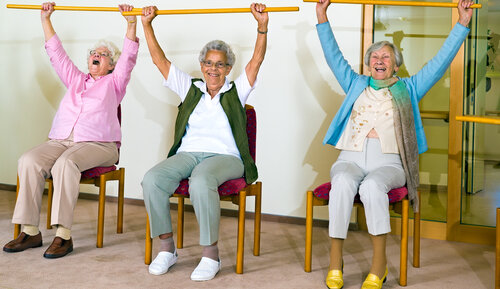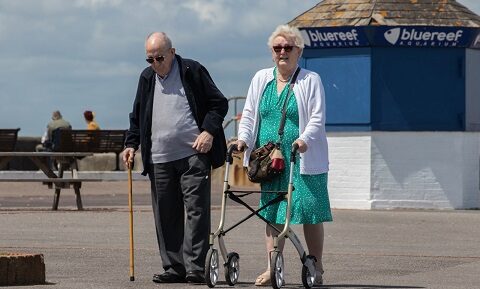
Page contents
A wide range of people work in care homes and nursing homes to ensure residents receive the care and support they need while living comfortable, happy lives. There are different roles to make sure the home is run smoothly and in line with national standards and guidelines.
If you’re curious about who works in residential care home, we’ve listed below all the people you can expect to find and what their duties are.
Care worker
Care workers, also called care assistants or support workers, help people in care homes with all aspects of daily living and interact with residents on a daily basis. This includes providing personal care, such as helping with bathing, washing, getting dressed, going to the toilet and changing continence pads and more.
The role of a care worker also involves assisting residents with eating and drinking and monitoring their health, booking and accompanying residents to appointments and administering medication.
When there is an activity going on, care workers will help residents engage and in general provide support whenever it is needed.
Senior care worker
A senior care worker’s role involves ensuring that the care provided to each resident is of high quality while managing a team of care workers. Training and mentoring newly recruited staff is also a part of the role.
Daily duties may include writing care plans, monitor residents’ health and wellbeing, complete patient medication records, keep in contact with residents’ families and manage the care team.
Deputy manager
A care home’s deputy manager will lead and manage the care team in their day-to-day duties to ensure care standards are high across the service. You will usually find deputy managers in larger care homes.
Deputy managers support the manager, and responsibilities include managing budgets, help with recruitment, conduct care assessments and provide cover for the manager as when needed.
Manager
A care home manager is the person responsible for the day-to-day running of the care home to ensure it meets standards and regulations as well as managing budgets and contracts.
As the leader of the care home, managers must work to strict legal requirements and monitor quality of care, health and safety and business performance. Care home managers are responsible for developing policies and practices as well as recruiting, training and supervise staff.
Managers should work to promote residents’ rights and be available to provide advice, support and information to residents, families and staff. The manager is also responsible for dealing with any complaints directed at the home or staff.
Registered nurse
The role of a nurse/registered nurse in a care home is to provide medical care to residents as and when needed. There are various qualification levels for nurses and their duties will reflect their skills.
In care homes with nursing, community and primary care nurses visit to provide nursing care as needed.
In nursing homes, at least one qualified registered nurse will be on-site 24-hours a day to provide care and supervise the care and support delivered by other members of staff. A registered nurse may have management responsibilities and oversee the running of the home.
Nurses manage conditions associated with ageing, frailty and provide care for residents with complex care needs. Duties include assessment of new residents, care planning and risk management, managing records, monitoring vital signs and progress, examinations, fluid and medication administration and drawing blood.
Activities coordinators
Many care homes have activities coordinators who arrange various events, activities, trips out organising entertainment to promote socialising, physical and emotional wellbeing and to encourage residents to live active, happy lives.
Activities are tailored to residents’ needs and abilities to ensure everyone can take part. To achieve this, the activities coordinator will talk to residents to understand their interests and what they like to do to keep busy.
Activities can be anything from having a magician visit to provide entertainment on a Friday night to a themed dinner party where residents can experience different foods and cultures.
Qualified dietician
The older we get the more difficult it can get to maintain a healthy diet and eat enough food to ensure we get all the nutrients, vitamins and fluids we need to avoid malnutrition. A good diet will help elderly residents maintain a healthy weight, fight off infections, reduce the risk of diseases, and help protect oral, dental, bone and joint health.
Because of this, many care homes either employ a dietician full-time or have them visit as and when needed to make sure they eat and drink well according to their dietary requirements.
Visiting healthcare professionals
At times, care home residents may need to see a qualified healthcare professional or therapist if they need additional care which cannot be provided by staff at their care home. Whilst some larger care homes may have various healthcare professionals on-site, others will arrange for healthcare professionals, such as GPs and dentists to visit.
Visiting healthcare professionals include:
- GPs
- Dentists
- Opticians
- Occupational therapists
- Counsellors
- Osteopaths
- Physiotherapists
Staff ratios in a care home
There are no legal requirements around staff ratios in care homes in terms of numbers. However, each care home must make sure it has enough staff to ensure each resident’s needs are met and other regulatory requirements are fulfilled.
For example, the Care Quality Commission (CQC), which is the regulator body for care homes in England, states in their regulation that:
“Providers must deploy sufficient numbers of suitably qualified, competent, skilled and experienced staff to make sure that they can meet people’s care and treatment needs and therefore meet the requirements of Section 2 of these regulations (the fundamental standards).”
While there is no set ratio that must be achieved, if the number of staff in a care home are not able to provide the care and support residents require, the care home has not achieved the required staff ratio.
Find your ideal care home
- Explore a wide range of care options and facilities
- Read independent ratings and reviews
- Connect directly with care homes to book a tour and discuss your needs


